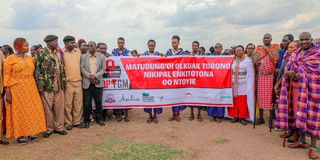Camp Lectures: Narok girls turn to alternative rite of passage to escape FGM, early marriage

Parents and girls during alternative rite of passage graduation ceremony at Eldoinyo Erinka Primary School at Talek in Narok West on August 23, 2024.
What you need to know:
- Since 2022 when the programme began, 464 girls have since benefitted.
- The programme targets young girls from the age of eight to 16 for mentorship.
Female genital mutilation (FGM), a deep-rooted cultural practice long held among the Maasai, is slowly turning into a highly sinister vice.
FGM, coupled with early marriage and teenage pregnancy, is now forming part of abhorrent practices in a section of the community.
The Maa are now turning to ‘camp lecturers’ as an alternative rite of passage (ARP). Girls graduate back into the community with life skills and lessons on harmful impacts of the vices.
On August 23, 2024, the third cohort of 264 adolescent girls from Narok West were released back into their communities, having been empowered both culturally and career-wise.
Among those who graduated at Eldoinyo Erinka Primary School, Talek, after rigorous training was 13-year-old Yvonne*.
By the time she stepped out of the training centre, Yvonne had made up her mind not to be part of the FGM initiation programme scheduled for December.
“I now understand that I do not need to undergo FGM to become a woman,” she says.
This, however, was not how she had pictured the cultural practice before being enrolled into the programme.
At 13, the teenager was looking forward to undergoing the cut to be initiated into womanhood, just like some of her friends.
The girl was also inspired by her elder sister, who secretly underwent FGM in 2020 when visiting their grandparents.
“We only learnt that she had sneaked from her grandmother’s house to join other girls who were taking part in the exercise within the neighbourhood,” her mother says.
Due to the fear of seeing her second daughter engage in the practice, Yvonne’s mother opted to enroll her in the Camp Lectures programme.
The mother says that besides the girls’ guardians, their friends act as a major influence and that has seen many of them fall into the FGM trap.
“The girls who have undergone the cut are always on the frontline, either discriminating against those yet to undergo the cut or urging the younger girls to be brave enough, face the cut and become ‘women’,” she says.
“The young girls have also been made to believe that they can only be taught how to be women during the initiation exercise. There are a number of societal expectations required of a girl once they become teenagers.”
FGM is the partial or total removal of the external genitalia and or injury to the female genital organ for cultural or other non-therapeutic reasons.
According to research by the FGM/C Research Initiative, the prevalence among women aged 15 to 49 years was 14.8 per cent as of 2022. The number, however, marked a decline from 38 per cent in 1998.
FGM prevalence remains high in the former Northeastern Province at 97.5 per cent. According to statistics, the prevalence among Maasai women is currently 56.7 per cent, despite the fact that the Constitution calls for protection of children and women from abuse and harmful cultural practices.
In an effort to reduce prevalence in Narok County, Maa Trust, a non-government organisation, has embarked on a community-led alternative rites of passage.
Through the programme, young girls are taken through one-week training as they transition to womanhood with dignity and without undergoing the cut.
The programme has seen young girls from the age of eight to 16 undergo mentorship. They are trained in reproductive health, impacts of FGM, general body hygiene and careers.
“During ARP, the girls are also taught about their community’s customs and traditions. This includes what is expected of them in society, including engaging in house chores, dressing, how to interact with the opposite gender and general body grooming,“ says Valerian Mbadi, the education and child rights manager at Maa Trust.
Mr Rogers*, a resident of Narok West, admits that having his third-born daughter enrolled in the programme is one of the best decisions he has ever made.
While his first two daughters underwent the cut a couple of years ago, the elderly man says he has yet to see the benefits of FGM.
“Over the years, we have been seeing more educated girls getting employed while some get into politics without being circumcised," says Mr Rogers, adding that failing to undergo the cut does not also bar a young woman from getting married.
He recalls how his first daughter got married a few years after the cut. The second girl, however, opted to stay back and clear her secondary education.
“Once circumcised, the young girls always have a feeling that they are grownups, can get married and have children whenever they deem fit," he says.
Yvonne's mother says FGM comes with a number of impacts, including early marriages and teen pregnancies, while, in most cases, the girls’ bodies are not ready for childbearing.
“Most of the young mothers always end up undergoing Caesarean section during child birth, which leaves them with scar. We also have those who end up suffering from fistula," he says.
Mr Mbadi says the Maa Trust launched the anti FGM programme in Narok County in 2022 and has saved more than 400 girls. The organisation settled on Narok West because of its high prevalence of teen pregnancies and early marriages.
“As an organisation, we are not saying the community's culture is bad; all we want is for them to drop the cut and uphold the rest of their practices," he says.
The campaign is a rigorous 10-month programme that involves engagement with different stakeholders at the community level.
Every year, the programme begins its activities in October by first engaging cultural and religious leaders, elderly women, traditional birth attendants, chiefs, village elders, Ministry of Interior officials, Children's department and men.
The participants are taken through child protection aimed at ending child marriages, early pregnancies and FGM.
Enlightenment
Mr Mbadi says they also take time to enlighten the adults on the harmful impacts of early pregnancies, including possible loss of life.
“We always take the men to the forest where we share barbecued beef, locally known as 'or pul' in Maasai culture and get to talk about the cultural practice.”
Once done with the meetings, the organisation engages the village elders to help find the young girls from the age of eight and yet to undergo the cut.
This year, the organisation enrolled 262 girls from 12 villages to take part in training. According to Mr Mbadi, its activities have continued to receive a positive impact since its inception in 2022.
“In 2022, we received 73 girls while the number increased to 140 in 2023,” says Mr Mbadi, adding that 464 girls have since benefitted.
Mr Ricky Rotich, Narok West sub-county children's officer, says that to ensure success, they always hold regular engagements with community members, including religious and cultural leaders, while enlightening them on the laws against FGM.
The officer also explains that girls have also been made aware of where to report in case they are forced to take part in the practice. Besides the Maa Trust, Mr Rotich says there are a series of projects running within Narok County that have seen the prevalence decline.
Apart from awareness creation, a number of non-government organisations have also put up safe houses where the young girls who evade FGM can be accommodated temporarily.
During their stay at the safe houses, their parents are taken through an educative programme on the impacts of FGM.
“Once they are on good terms, the young girls are integrated back into their families. Family plays an important role in the community; that is why we work to ensure they go back to their homes,” says Mr Rotich, adding that they also do regular follow-ups to check on the girls.
He also shared that the programme has seen more girls clear their education while teen marriages and pregnancies have reduced.
“We hope to see more girls move to tertiary institutions to pursue their dream careers to bring development in the community in the future,” Mr Rotich says.
*Names changed to protect their identities.





